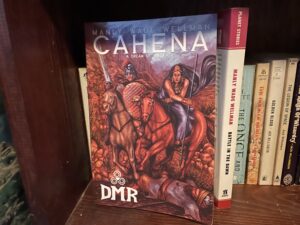
Christmas gifts can extend the season substantially. I received a Christmas present of the DMR edition of Manly Wade Wellman’s novel Cahena: A Dream of the Past. I read it this week, thus drawing my holiday out longer. Well, Merry Christmas to me; what a fine gift.
Manly Wade Wellman was one of the last of the pulp authors. He was perhaps best known for his Silver John stories. I particularly enjoyed his Kardios of Atlantis stories, and I like his paranormal detective character John Thunstone. Cahena is a tonally different work. Ostensibly it is a work of historical fiction. When the first suggestions of the supernatural appeared in the narrative, my first instinct was to compare it to John Myers Myers’ The Harp and the Blade, another work of historical fiction that incorporates just enough hints of the numinous that it was marketed as fantasy. But the supernatural element in Cahena grew more pronounced as the story went along. The disappearance of gods, spirits, and magic became a bit of a plot point. And there is another major divergence between the two works. Myers’ tale is a glittering, witty work full of the joy of living. Wellman could write in a similar vein (c.f. the Kardios stories.) Yet he employed an entirely different approach in Cahena. His style here is spare, almost Hemingway-esque, shorn of adornment.
The style is appropriate. Cahena, you see, is a tragic work. The terse narrative grounds the story in harsh reality. Even the mentions of magical healing, of the sightings of the death god choosing those to be slain, of vampires and fortune telling come across as matter of fact, quotidian. Whereas Harp and Blade is celebratory, Cahena is elegiac, resigned. Its moments of feasting and lovemaking do not revel in life for the sake of life, but rather are moments to be savored because death is always imminent. Everything is a rearguard action. Nothing can be trusted. A lover can be supplanted by another. Treachery is inescapable. The very gods will disappear. Only Death remains.
So, yes, it is grim. But don’t let that put you off. It is good.
The book begins with a framing sequence. The main character, Wulf the Saxon, is brought to the tent of Charles Martel before the Battle of Tours, and tells the tale of the warrior queen, Cahena, with the supposed purpose of providing Charles an idea of how to fight the invading Moslem army. Wulf narrates his experience of twenty or so years before serving as Cahena’s advisor, general, and sometime lover, trying to hold off the Moslem army sweeping through North Africa. It is an engrossing story, filled with architectural, culinary, and cultural detail, exciting battles, friendships, betrayals, and a gradually increasing sense of inevitable loss: Fate, resignation, but never quite despair.
History, drawn out long enough, simply doesn’t provide happy endings. Nonetheless, Cahena is well worth the read. You might also enjoy something of mine. Picking at random from the vanity shelf…Under Strange Suns. Give that one a read, I think you’ll like it.

1 comment